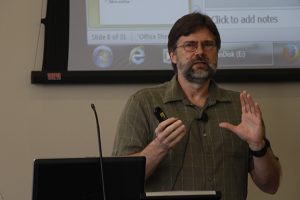Lecture series explores nation’s place in the modern world
Are human beings any different from frogs? According to Dr. Andrew Drozd, this question appears often in the literature of great Russian authors of the 19th century, and the answer is almost always a resounding “No.”
Monday, September 15, the associate professor of Russian spoke to a group of students about this philosophical conundrum, using the archetype of doctors in the worlds constructed by authors like Tolstoy, Turgenev, and Dostoevsky.
His talk was part of a new series, “Russia and the Modern World,” sponsored by faculty and students in the Department of Modern Languages and Classics.

Drozd argued that Russian culture must have, in the pre-Soviet era, valued tradition over Western medicine, noting the caricatures of what he called “celebrity doctors” in the text as being incompetent. Sometimes they merely failed in morality, other times in skill. These characters, he argues, even when written as protagonists such as in The Brothers Karamazov, in which both main characters are medical students, succeed only when they transcend medical training and treat patients with compassion instead of pills.
“There must be something deep in Russian culture that says, hey, maybe they’re not all that. If a man from the mountains can cure the incurable, something must be wrong with the system,” Drozd said.
And, he suggests, this may be linked to defiance of the Westernization of Russia — hence the topic of the lecture series, “Russia and the Modern World.”
Drozd’s talk was the first of three lectures in the series, sponsored by Drozd, Associate Professor Margaret Peacock and the Russian/Eastern European Club.
“Last spring, the Russian department did a panel on the situation in Ukraine,” Drodz said. “That wasn’t my area of study so I spent a lot of time brushing up, but we liked it so much we wanted to continue. The books I’m talking about I teach in class, and I hope the talk gets people to pick up a few.”
Peacock will be giving the next talk on Vladimir Putin on Oct. 15 in Gorgas 205, attempting to dissect him as a politician, as a person.
“We’re talking about a guy who is borderline schizophrenic, who has ties to the KGB. It’s interesting. The Eastern, Russian press sort of sees him glorified. He’s a hero. But the Western press completely demonizes him,” Peacock said. “What I’m looking for is something in the middle: the human side.”
And why attend such a lecture?
“Russia is in the news all the time, and people may not have the knowledge or the background to interpret all these things happening in Eastern Europe,” Peacock said, “Why Georgia? You know, why Crimea?”
The third and final talk, scheduled for Nov. 14, is still in the works.